Gut Check: Microbiome and Food Allergy Development with Liam O'Mahony, PhD
- What is the gut microbiome and the role it plays in human development and infancy
- How crucial the microbiome is in the development of food allergies and whether it determines the tolerance to certain foods that are offered to a baby.
- Suggestions on how to improve a baby's microbiome status through the introduction of a variety of foods including potentially allergenic ones.
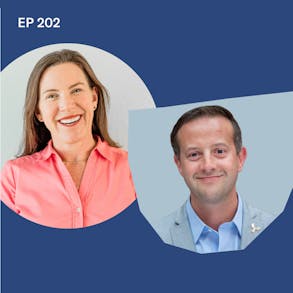
LISTEN TO THIS EPISODE
Episode Description
Have you ever wondered how the bacteria present in your baby’s gut can have an effect on allergic reactions? In this episode researcher, professor and immunologist Liam O’Mahony PhD, who specializes in the basic mechanisms by which microbes influence allergic sensitization within the gut, joins me to talk about how a baby’s gut microbiome can play a role in food allergies and how diet diversity can help decrease allergy risks.
About the Guest
- Liam O’Mahony is an immunologist, researcher and professor of Immunology at the Department of Medicine and Microbiology, APC Microbiome Ireland, National University of Ireland, in Cork, Ireland.
- His research interests are focused on the molecular basis for microbe and metabolite modulation of mucosal inflammatory responses.

Links from This Episode
- Follow Liam O’Mahony on Twitter: @ liam_omahony1
- Healthy infants harbor intestinal bacteria that protect against food allergy | Nature Medicine
- Early-life gut microbiome composition and milk allergy resolution (nih.gov)
- Baby-Led Weaning with Katie Ferraro program with the 100 First Foods™ Daily Meal Plan, join here: https://babyledweaning.co/program
- Baby-Led Weaning for Beginners free online workshop with 100 First Foods™ list to all attendees, register here: https://babyledweaning.co/baby-led-weaning-for-beginners
Other episodes related to this topic:

Latest Episodes
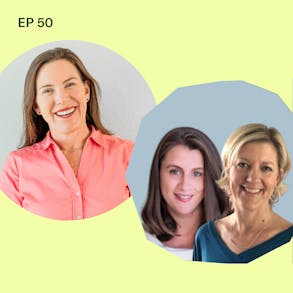
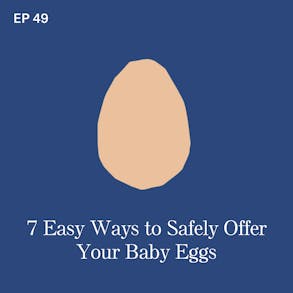

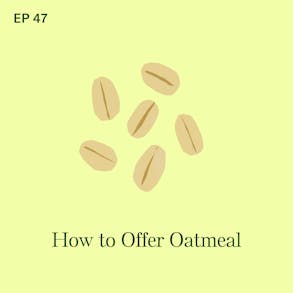

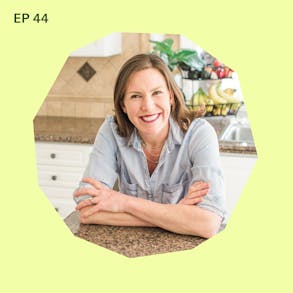
Liam O’Mahony, (0s):
So the more sources of bacteria, the more the baby would be exposed to. And these are all healthy exposures. The baby needs to be eating the right foods to support the growth of these new bacteria and to make sure they make the right metabolites, that will help all the other body systems
Katie Ferraro (16s):
Hey there, Im Katie Ferraro, Registered Dietitian college nutrition, professor and mom of seven specializing in baby led weaning here on the baby led weaning made easy podcast. I help you strip out all of the noise and nonsense about feeding, leaving you with the competence and knowledge you need to give your baby a safe start to solid foods using baby led weaning. Well, hello there. Welcome to this episode about your baby's micro biome and how the microbes situation going on in a baby's gut affects not only food allergy risk, but also some other potential health outcomes.
Katie Ferraro (57s):
My guest today is Liam O’Mahony,. He's a PhD researcher and professor from the university college cork in Ireland. Liam is an immunologist and he focuses on wait for it. The molecular basis for microbe and metabolite modulation of mucosal, inflammatory responses stay with me. Basically Liam's research is on how do bugs make things good or bad in the human gut? So he investigates how microbes influence allergic sensitization within the gut and the skin and the lungs. And I've been really wanting to talk to Liam and kind of pick his brain about the research that's coming out, showing that diet diversity, okay. Offering your baby a wide variety of different types of foods early and often.
Katie Ferraro (1m 42s):
How does that impact? Not just food allergy risk, although it really does, but other health outcomes as well. So there's not a lot of researchers who can take kind of complex research about the microbiome and explain it in as straight forward and easy to understand terms as Liam. So I'm very, very grateful for him taking the time to join us today. He did this interview after a super long day. He literally was like around the world doing presentations. And I was like, I'm so grateful. Thank you so much for doing this. He's like, I will talk about feeding babies for as long as you want to. So I hope you guys enjoyed this interview. It's called Gut Check Microbiome and Food Allergy Development with Liam O’Mahony, PhD.
Liam O’Mahony, (2m 24s):
Thank you for the invitation, Katie. It's a pleasure to be here
Katie Ferraro (2m 27s):
Okay for our parents and myself. Not very familiar with the term Microbiome. Like I hear it thrown around and I'm like, what exactly is the microbiome? Could you define it for people who do not have a PhD in immunology and tell us why it's so important in human development and infancy.
Liam O’Mahony, (2m 45s):
So people use the term Microbiome and microbiota interchangeably, and really what it refers to is the bacteria that are living in us and on us. And they're incredibly important. And I'll tell you just some silly facts. So if you add up all of the bacteria that live in you and on you, it's adds up to the same number of cells, human cells that you have in the body. So half yourselves are bacteria, that's your Microbiome. And if you take the genes associated with them, because there's so many different types of bacteria, you get 20 million genes that are bacteria, the human genome, we know how important it is. It's 20,000 genes. So that means we're 99% genetically speaking bacterial, actually.
Liam O’Mahony, (3m 27s):
So that's your microbiome. That's the bacteria that live in us and on us and that when people hear bacteria, they always say, oh, it's dirty. It causes disease. You know, it's so wrong. It's so rare that a bacteria will cause a disease. The vast majority of them are there to help us. And all we evolved with bacteria. Most of the functions that they do, we cannot do a lot of digestion that they carry out the help, the immune system that produce vitamins, that we don't get from food. There's just so many things that we're really learning all the time of wonderful things that they're doing for us. So we really liked the Microbiome and we think when it comes to early life, the acquisition of these bacteria and their development also goes hand in hand with everything else that's developing in the baby and also needs equal care and attention.
Katie Ferraro (4m 17s):
So you mentioned the acquisition of these bacteria in infancy, early childhood. How do we actually go about acquiring these bacteria?
Liam O’Mahony, (4m 27s):
So we're very good at passing the bacteria from, to each other. So there's two kind of main areas where getting the bacteria into a baby and also making sure they establish and they make the right things. There's two areas to think about. One is you need the bacteria to come from somewhere. So they come from the mom, the dad, older siblings, wider family members and so on, but they also come from green leafy environments that come from pets in the home. So the more sources of bacteria you are, the more the baby would be exposed to, and these are all healthy exposures. Then the second thing is the baby needs to be eating the right foods to support the growth of these new bacteria and to make sure they make the right metabolites, that will help all the other body systems.
Liam O’Mahony, (5m 14s):
So breastfeeding is incredibly important. There are sugars in breast milk that are not designed for the baby at all. They're called human milk oligosaccharides. So the mom chemically modifies the sugars. The baby can't use them. They go into the colon of the baby and very specific types of bacteria. There can utilize these. So the mom actually already gives the food to the baby to support specific microbiomes, early life. And then once the baby starts to ween, there is really important foods that contain fibers. That again, cannot be digested by the baby, but can be digested by these bacteria as food, but also to generate metabolites that help the developing system.
Katie Ferraro (5m 58s):
So how crucial is this microbiome business in the development of food allergies, like does a baby's microbiome status and I don't know how you measure it, but does it determine tolerance to certain foods? Does it increase or decrease risk of food allergy later in life?
Liam O’Mahony, (6m 14s):
Absolutely. So it's often very hard in human studies, as you can imagine to tease apart what comes first, but clearly in babies with food allergies, their microbiomes are very, very different to healthy babies. And what we and others have been trying to do is take elements of that into a laboratory-based or your exoteric types of experimental models and see what effect these changes in the microbiome might have on the immune system. And definitely we can link that, you know, if we're missing certain bacteria early in life or their development is delayed, the immune system is also delayed. And so for a lot of babies with food allergy, we think the microbiome is a really incredibly important part of the issue
Katie Ferraro (6m 58s):
And so then what is the link there? I know of course it's hard in the human studies to tease out, but what is it that the babies without the food allergies and the quote unquote, better microbiome, what are they exposed to or what's different in them or maybe in their food environment versus babies who don't have the food allergies?
Liam O’Mahony, (7m 16s):
So one of the things on a very, I guess, a broad level is being exposed to multiple different types of non-dangerous encounters, really trains the immune system to learn. This is dangerous. This is not dangerous. And remember your immune systems should see a food as being non dangerous. So it's a mistake when the immune system recognizes a food and causes a food allergy, or it's a mistaken identity. So an immune system that early life gets well-trained to the difference between something that's dangerous and something that's not dangerous, it shouldn't stand overreact to something like a food that's on one side. And on the other side, you know, we've shown in kids that are protected from food allergies.
Liam O’Mahony, (7m 59s):
They have a lot of bacteria that are making metabolites called short chain fatty acids. So these are very, very small fats and these bacteria make them from the fibers that the babies are eating. And these seem to be really protective because they support the growth of T regulatory cells, which are a key component of a protection against allergy.
Katie Ferraro (8m 20s):
So the parent is interested in improving the status of their baby's microbiome. Is there any data to suggest that diet diversity or exposure to a greater number of foods and different types of foods, including potentially allergenic foods that that can help reduce food allergy risk?
Liam O’Mahony, (8m 36s):
Absolutely. That's exactly right. And even from the time of being pregnant, Carina Venter, has recently shown that diversity, even during pregnancy is important and particularly diversity in fruits and veggies, just not diversity in fast foods. It's really, you know, it's diversities in the foods that we all know are in teary, healthy and good for us. And I guess that's what we're doing. We're starting to put some science behind this to actually identify what, how are these foods healthy? And it seems by giving a wide diversity of these types of foods as well to the mom as well, to the infant, you're driving all these different types of bacteria or you're supporting them.
Liam O’Mahony, (9m 17s):
And you get a wide breadth of metabolites that are made that really support immune system effectively. So diversity in all walks of life is so good for your
Katie Ferraro (9m 28s):
System. Just not diversity and fast foods. We got it
Liam O’Mahony, (9m 31s):
Exactly
Katie Ferraro (9m 32s):
Well, you've achieved Carina Venter, who I am so grateful introduced us because we have long drawn out conversations about the benefits of diet diversity. And in 2016, I created the a hundred FIRST FOODS approach to starting solids with Baby led Weaning. So we have babies eat a hundred different foods from five different food categories, including the allergenic foods before they're age one. And, and the benefits play out across many different areas, right? Reduction in the severity of picky, eating increased independence in eating less likelihood for food allergies. And so I'm really interested in this other piece, which is about baby's gut health and that Carina and I sometimes go down a rabbit hole and how to measure, right, like the way a researcher measures a food for her. It's when the baby swallows, but when babies Starting Solid Foods, there's not always a lot of swallowing going on.
Katie Ferraro (10m 16s):
So I was just curious in your line of research, are you guys quantifying how many different foods babies need to eat in order to achieve X, Y, or Z with regard to microbiome health?
Liam O’Mahony, (10m 28s):
This is a really hot topic. You're right. And I suppose one of the complexities is it won't be the same for all our babies. And it's really hard to make these broad recommendations, but definitely in general, more is better. People have attempted to, for instance, get maybe the top 10 allergenic foods into a diet that maybe during a week you would touch on all of them. And I think that's really the right approach, but is it 10 is the best number? Is it 20? I couldn't say, but really, yeah. You should try to improve diversity of an, the number of different foods, as much as there's reasonable within the background that you live in the cultural backgrounds, you know, what there's different diversities and different types of foods and different backgrounds of people.
Katie Ferraro (11m 14s):
I know parents get really frustrated. Would you give them that recommendation about, you know, how capable, how much of the allergenic food should we introduce? Well, there's no data to say that doing six grams, two times a week versus three times a week of peanut protein would be more or less protective. But we do know that there's no benefit to withholding these foods and the general rule of thumb, every researcher we have on, we'll say it without sometimes saying it numbers, but like, Hey, early in often is key, but we don't know exactly how much of X, Y, or Z food, a baby needs to get the benefit. Would you agree that that's kind of where the research is in your area right now
Liam O’Mahony, (11m 47s):
There, the recommendations to your delay, introduction of allergenic foods that was there in decades previous, that was actually completely wrong. We know now that particularly in kids who might have a susceptibility to developing allergies in particular, these kids would benefit from early introduction. That's not introduction, you know, in the first month of life, but when the baby can start to eat these types of foods, don't delay us. And there's really good clinical evidence for peanut, for instance. And the risk of peanut allergy is reduced many fold by early introduction of peanuts.
Katie Ferraro (12m 23s):
I know we have good evidence for peanut and less great, but still okay. Evidence for egg and milk. And then the rest of them, like in the U S we have nine of the big allergenic foods. It was the big eight and they add Sesame. So the other six parents were like, well, what about that area? We say, listen, even though we don't know as much about those six, as we do about milk and egg and peanut, we still know there's no benefit to withholding it. And you mentioned that, but also in the United States, I don't know if it's the same in Ireland. Pediatricians are still routinely giving advice. That's over 20 years old about don't feed your baby egg white until they turn one. Like, that's actually dangerous advice at this point, based on what we know with current research and updated guidelines. So how do you deal with that? I know you work in a global environment, like are parents hearing that outdated advice, or do you think they're getting this message about introducing these allergenic foods early and often?
Liam O’Mahony, (13m 10s):
I still think there is a lot of fear of there. And, you know, I was giving a radio interview about a year ago, talking about peanuts early in life and the rate you interviewer, and this is a national radio show. She said, but babies will explode if we give them peanuts early in life. And I really had to say was, I would be
Katie Ferraro (13m 29s):
Like prep for your interview. You clearly haven't read any data in
Liam O’Mahony, (13m 32s):
The last 20 years. And genuinely, that is great feedback for me to hear because you know why, you know, the scientific and clinical world, we know the proof is very much the opposite. I think what you're touching on is, is actually we haven't done the right type of education and there is a fear factor out there that well, well, what if, and it's actually people should turn it around because if you don't introduce these things early in life, you're going to cause more harm. So that what if, you know, arguments should get thrown out the window.
Katie Ferraro (14m 3s):
I am for a researcher. You make a very good marketer because those are the messages that actually stick in Korean. And I talk about that a lot. Like the research that's being done is so important. It is not trickling down to the pediatricians, at least in our country where parents go to get their information about food. And one of the unfortunate consequences is that they're getting misinformation, but also doctors in this country, the vast majority of them have never even taken a dedicated nutrition class. So they don't know basic infant feeding. And they're certainly not aware of these newer guidelines. We have all sorts of data that shows that pediatricians are not talking about early introduction. So I appreciate a researcher like you willing to come on to a lay person podcast. Our audience is primarily not healthcare professionals because they hear this information from the researchers and then sometimes go back to the pediatricians and like, Hey, what's up with that recommendation that you're giving me.
Katie Ferraro (14m 49s):
That's basically more than 20 years old. And now, you know, wildly inaccurate and outdated.
Liam O’Mahony, (14m 53s):
It is really no reason to delay what's. The baby is ready itself to eat these types of foods. There's no reason to delay any of these. And of course be always careful of choke hazards. That's suppose I saying don't give whole foods.
Katie Ferraro (15m 7s):
No, it was a lot about reducing choking risks. So you don't have to worry about us. We're good. We're good. Can I ask you a little bit about milk allergy? Because again, end of the day, true food allergy still quite rare in infancy. I know, even though we talk about it a lot and it's, you know, your life's work, but we know that cow's milk allergy is one of the most common allergies among babies. Curious if you're aware of, or does research point to any differences in the microbiomes of babies who are allergic to cow's milk and those who are not, not vague and tolerance stuff like true cows milk, protein allergy.
Liam O’Mahony, (15m 38s):
So there are a couple of really key stone studies that really stand out. So there's one study from the US published in 2019. And what those authors did was they transplanted the microbiome from cosmic allergic babies or healthy babies into mice that didn't have any microbiomes. And then they replicated the food are the, the milk allergy in those mice and the mice that got the microbiomes from healthy babies didn't develop any allergic symptoms, didn't get anaphylaxis. Whereas the bisect got the microbes from the cow's milk, allergic babies, they developed anaphylaxis. So again, kind of a demonstration of there's something missing in that Microbiome and other studies have shown that the kids who naturally become tolerant to milk over a few years, their microbiomes are completely different.
Liam O’Mahony, (16m 26s):
So again, suggested that even if a kid has cow's milk allergy early lives, depending on their Microbiome and improvement in the microbiome that can support a new tolerogenic immune response, that over time would overcome the allergy to milk.
Katie Ferraro (16m 41s):
And we've talked and had Karena on the podcast talking about the use of ladders, dairy ladder and egg ladder for reintroduction of these foods, which to be honest in the United States is not talked about very often, but I do understand more so in the UK and other European countries, that they are utilizing these ways to reintroduce foods, to babies and children who were previously quote unquote, truly allergic.
Liam O’Mahony, (16m 60s):
Yeah. And Carina has really pioneered all of this. She's really the star of the show when it comes to the ladders and managing that transition from being truly allergic to perhaps being tolerant, fully tolerant to a food. And that process that has to be done today can be quite scary within the home for parents who are used to really avoiding something,
Katie Ferraro (17m 21s):
But it can also be such a godsend. I mean, they've been told that the only therapy is lifelong avoidance of that allergenic food. And now here's the way that we're actually using food to reintroduce the foods and to help increase tones. I think it's fascinating. And again, very appreciative to Carina for coming and explaining that. Cause you know, you look at some of the source documents. I'm like, God, this doesn't make any sense to me as a non researcher, but we see parents using it in the household and using it successfully. And again, it might not work for all families, but at least to know the option is out there very promising for some families.
Liam O’Mahony, (17m 51s):
That's right. And I think at the same time, what we're really trying to do is to come up with some really good Microbiome and interventions or metabolite interventions are even pairing and Microbiome and a food together that could really help this process along. I don't think a food And a, let's say a probiotic will ever be like a full cure for food allergy, but it can help things along. And it can maybe speed up the process through the ladder, or it can maybe allow you to get away with an accidental contaminant at a low level. You know what I mean? That, so that's really kind of what we're really hoping to do over the next couple of years is to have also some of those kinds of Microbiome and Food related options for parents of food, allergic kids.
Katie Ferraro (18m 35s):
Curious if you could explain how the quality and I know that's a subjective term of a baby's diet impacts the microbiome development or the survival of certain gut microbes. Cause I've heard for example, reliance on refined white carbohydrates like white rice cereal and infancy can actually set the stage for an unhealthy microbiome. Is there any truth to that?
Liam O’Mahony, (18m 56s):
So yeah, so a lot of the refined foods are processed foods in general, you know, the highly processed foods often remove a lot of the fibers. You know, the brands, the parts of the food that as humans, we can't really gain access to put your microbes doing it's essential for the microbes, for their survival and for their metabolism. And so white rice is the same as brown rice, except you've taken away the wheat germ and the bran, which are really important parts of the rice. Now it shows life as much better when it's white rice and it's, so it can travel for years around the world. And it also, I mean, it is a good source of food for the baby. I'm not taking away from that, but if you're thinking about your microbiome, it really doesn't help your microbiome.
Liam O’Mahony, (19m 40s):
And also a lot of the, again, the really heavily processed foods, they contain agents, not antibiotics, but anti-microbial type agents to protect the food from spoilage, of course. But when you ingest it into the gut, it can also have a negative effect on gosh microbes. So there's a whole range of things that would heavily processed foods. They definitely don't support a good microbiome and in some cases contaminate,
Katie Ferraro (20m 4s):
And this is going to be a leading question because I'm a dietician and I'm a big advocate of food first approaches, but as a researcher, do you think there's any benefits to doing supplemental forms of, for example, probiotics, for neuro-typical healthy babies that don't have underlying conditions and lots of antibiotics, like should everyone just jump to supplements and you don't have to answer that question if it's too like touchpoint for you.
Liam O’Mahony, (20m 26s):
No, I see where you're going with it. And I do agree with the use of supplements in general, because I think a lot of the foods that we have access to today are actually our core quality. Even though we're doing our best, just the nature of where we live, that foods we have access to often you do need to supplement even with the best intentions in the world. But what I would love to do is not have to supplement. I would love that we could all have access to your high quality foods, your all eat yogurts every day, which is a natural way of getting probiotics. And that's all during healthy development. When it comes to disease, it's completely different. Now you have something that's gone wrong, you need to, you know, there's something missing.
Liam O’Mahony, (21m 8s):
There's something needs to be repaired. There. Supplements have, have a great role to play.
Katie Ferraro (21m 13s):
Liam, thank you so much for taking the time to explain what our very complex theories and research that you do. And before you go, I just want to ask you like on a daily basis, what do you do in your job? Because you are known in lots of different areas of research, but I'm like, I know you've been around the world on zoom calls today. So I appreciate you joining me here in north America, but like, what are you doing right now? And what's the thing about your current work that excites you the most?
Liam O’Mahony, (21m 37s):
So my research interest is really trying to understand how the new system sees the world that we live in. So that's the food that we eat, the microbes we get exposed to when you go for a walk in the park, you'll how does the immune system see the good and the bad that's all around you? And I think it's really trying to put some science behind the kinds of things that we know will make, make us healthy. So that's a very broad thing to say, but, you know, just for example today. So I spent a few hours in the lab in the morning with my students, with my staff, talking about projects. Then I was sitting in front of a computer probably for about six hours with gave a presentation in Switzerland and had a call with people, designing an educational course to teach nutrition to clinicians.
Liam O’Mahony, (22m 21s):
And so every hour it's something different. So I, I, I love what I do in my job because it gives me again, diversity it's in the job is also important. There's a diversity of activities, but also of interest within that theme of how to really understand what the immune system's there for. And I think it's there as a communications device. It's not there like an army to kill everything we come in contact with, but actually it's more like a communication system that really tries to interpret everything that we're exposed to and then coordinate an appropriate response to the us.
Katie Ferraro (22m 56s):
Well, Liam, where can our audience go to learn more about the work that you and your research team are doing?
Liam O’Mahony, (23m 1s):
So the Institute in UCC that I'm part of the APC microbiome Ireland, if you just type in Google APC, microbiome, you'll find this, I am on Twitter and I do tweet a lot of research articles and our own articles. So it's @liam_omahony1. So if you follow me there, I promise I won't talk about anything political just purely decides.
Katie Ferraro (23m 24s):
And this was a lovely nonpolitical conversation. And I know you're grateful that cause you've had a long day with a lot of politics. So some beetle babies are incredibly not polarizing. People love to just learn about how to help babies eat well. So thank you so much for the research that you do it for taking the time to do this interview with us.
Liam O’Mahony, (23m 40s):
Thank you so much, Katie.
Katie Ferraro (23m 42s):
I felt so bad. I kept asking my questions and questions that weren't on the question list, but he was really nice about answering them, sorry, but when you get a researcher on who actually could talk to adults that are not researchers about things that are of interest that of like feeding their baby a wide variety of foods to help prevent food allergy, you got to keep a bond. So Liam, thank you for staying on at the end of your very, very long day to do this interview for us. I am going to link to all of Liam's resources, including a couple of those research articles that he was mentioning on the show notes page for this episode, which you guys can find at blwpodcast.com/202. Thanks for listening. Keep that diet diversity up. You guys it's really gonna pay off at like the gut-level ad for other health outcomes for your baby as well.
Katie Ferraro (24m 25s):
See you next time.Bye now.

The Program Baby-Led Weaning with Katie Ferraro
A step-by-step digital program for starting solid foods safely and navigating the original 100 FIRST FOODS™ meal plan with baby-led weaning.
 EXPERT-LED, PROVEN APPROACH TO EATING REAL FOOD
EXPERT-LED, PROVEN APPROACH TO EATING REAL FOOD CONCISE VIDEO TRAININGS TO MASTER BABY-LED WEANING
CONCISE VIDEO TRAININGS TO MASTER BABY-LED WEANING 100 FIRST FOODS DAILY MEAL PLAN WITH FOOD PREP VIDEOS
100 FIRST FOODS DAILY MEAL PLAN WITH FOOD PREP VIDEOS
Baby-Led Weaning for Beginners Free Workshop
Is your baby ready to start solid foods, but you’re not sure where to start? Get ready to give your baby a solid foundation to a lifetime of loving real food…even if you’re feeling overwhelmed or confused about this next stage of infant feeding.
Get baby-led weaning recipes and tips delivered to your email inbox.

